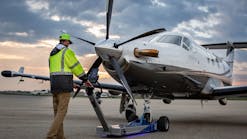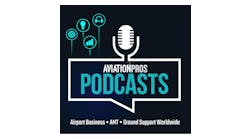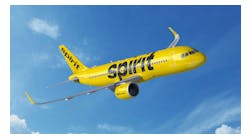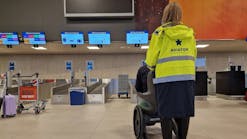FMC Airport Systems' global ground support team offers a look ahead to trends and events that could affect our industry, reports Michelle Garetson
January 2004
While no one in aviation possesses a crystal ball to see the future of the industry, GSE manufacturers really have to monitor changes taking place to predict how those changes will affect the industry and more importantly, their customers' requirements. Recently, Ground Support Magazine had the opportunity to speak with members of the Global Ground Support Equipment team from FMC: Chuck Durst, General Manager; Nick Heemskerk, Product Development Manager; and Gene Johnson, Business Development & Marketing Manager, and hear what they think will happen to the ground support industry in the near term and in the future.
Defining the divisions
Johnson offers that FMC Technologies has continued to evolve with innovative technology for over 100 years -from citrus sprayer to deicer, military equipment to cargo handling equipment and more. FMC came on to the airline scene in the 1960's and now boasts a large network of agents and distributors with more than 200 customers and coverage in over 130 countries and is comprised of three business units:
1. Jetway in Ogden, UT with Dale Sumpter as its General Manager.Durst explains the mission for the GSE business, 'Becoming our customers' most valued supplier.' "Our focus is to ensure that we act and operate as one company around the world working as a team to take care of customers," says Durst. "No matter where our customer is and where the office is that typically supports them, we share resources and service technicians and salespeople to make it happen for our customers. To accomplish this we have focused our business on three key areas; innovative technology, delivered quality and aftermarket support."Industry Trends Durst explains that they look at the GSE business from a number of angles - one of them being passenger airlines. "Our assessment is that 2004 is more or less a recovery year for the US domestic and many of the European airlines. We think their financial health will improve in 2004 as we're starting to see it now and that they'll take some time to repair their balance sheets." He continues, "What that means to GSE suppliers is that we think we'll see some spending for 'really need to have' equipment where they've been sort of holding back for the last couple of years. We also think there will be GSE authorization for funding when there's an operating cost improvement that can keep with a short payback - a one or two year payback. We think those kinds of investments will go forward."
2. FAS - (FMC Airport Services) also in Ogden and headed by Barbara Hermann.
3. GSE Business, which is headquartered in Orlando, FL with Chuck Durst, General Manager at the helm. FMC also has sales and service offices in London, Singapore, Beijing, and Madrid, which is also a manufacturing facility. FMC also has offices (corporate locations) that do sales and service in South Africa and Australia.
FMC's global ground support team: (L to R) Nick Heemskerk, Chuck Durst, and Gene Johnson. Johnson continues, "In 2005, we'll start to see more or less of a normal year for GSE purchasing activity from the customers such as passenger airlines. We're not predicting any kind of flood of pent up demand - everybody will go at their own pace and it will be spread out over time in sort of a ramp up back to a normal level. There is some excess capacity of equipment out there and that's going to be utilized before we see new purchases." Durst offers that low cost airlines have been really active and are still growing. FMC has seen a drop off in mainline carrier activities and is watching with interest at those majors that are trying to get into the low cost airline business. "Historically, that hasn't been successful so it will be interesting to see if they're able to change their model and operate differently," says Durst. "A lot of low fare carriers are taking capacity from the mainlines in some ways so they're not really adding capacity to do that - they're just changing the nature of that capacity. As long as they do that, it doesn't damage the economics of the business in terms of the supply/demand equation." He adds, "If everybody is chasing after their own market share growth I think they'll continue to struggle. If they stay disciplined and allow the industry to correct itself, then I think they'll see a faster recovery. It all depends on how fast the demand improves. I think the smarter approach from our perspective is that it seems that demand is not going to necessarily grow that fast to solve the problems, so there is a need for discipline." Another segment FMC looks at is freight companies. Freight companies have continued to buy and have not been affected by the dynamics that the passenger airlines have. The group expects these companies to continue to grow based on the economic activity of the world economy. "That's really what fuels them," says Durst. "The one dynamic that's happening to freight companies is the large competitive activity going on right now between FedEx, UPS, DHL, and others. What we expect to happen in the short-term is that they're all trying to expand their various hubs around the world. That's positive activity for GSE suppliers and hopefully, there's enough growth in freight to support all that expansion that's going on." Ground handlers is the third segment to watch."Ground handlers have been fairly active in a substantial part of the customer base in Europe," says Durst. "With the dynamics in the passenger airlines, obviously, they're looking for outsourcing opportunities and we have seen increased activities of ground handlers in the domestic US market. The expectation is that ground handlers will continue to grow and become a more important customer base for us over time." Geography lessons Geographically, the group shares that they see that the Asian market has rebounded from SARS and fully back on track to their high growth rate and is encouraged by what is going on in China. "We expect further growth in the Chinese market as they try to develop their Western provinces." Durst recalls a comment he had heard regarding this development, "We [America] grew the West with the locomotive, China will grow their West with airlines." Other significant growth areas involve Russia, the Middle East, and the emerging future EU countries. "Those that are in the EU that are on the developing side or those that are planning to join the EU- we're seeing them getting into a position where they're receiving funding to improve their infrastructure and expand," explains Durst. "That's resulting in airport expansions and improvements, which then results in GSE sales." He adds that western Europe is experiencing spotty expectations for activity and some of the more traditional markets, most of them northern European, tend to be in a fairly slow growth environment, similar to the US. According to Durst, more of the southern European countries have been going through a development phase. "We're seeing more activity in those countries than in western Europe," he says. "The US will struggle under its overcapacity and again, I think we'll see a rather slow emergence of improvement for a couple years." How can the US improve? What has to take place? "It's a combination of demand on the airlines and that's a function of economic activity, maybe an improvement in business travel if they ever come back," answers Durst. "But, beyond that, I think there's a lot to do with discipline in the airlines in how they maintain their capacity in check with their demands." FMC product rollouts in 2004







